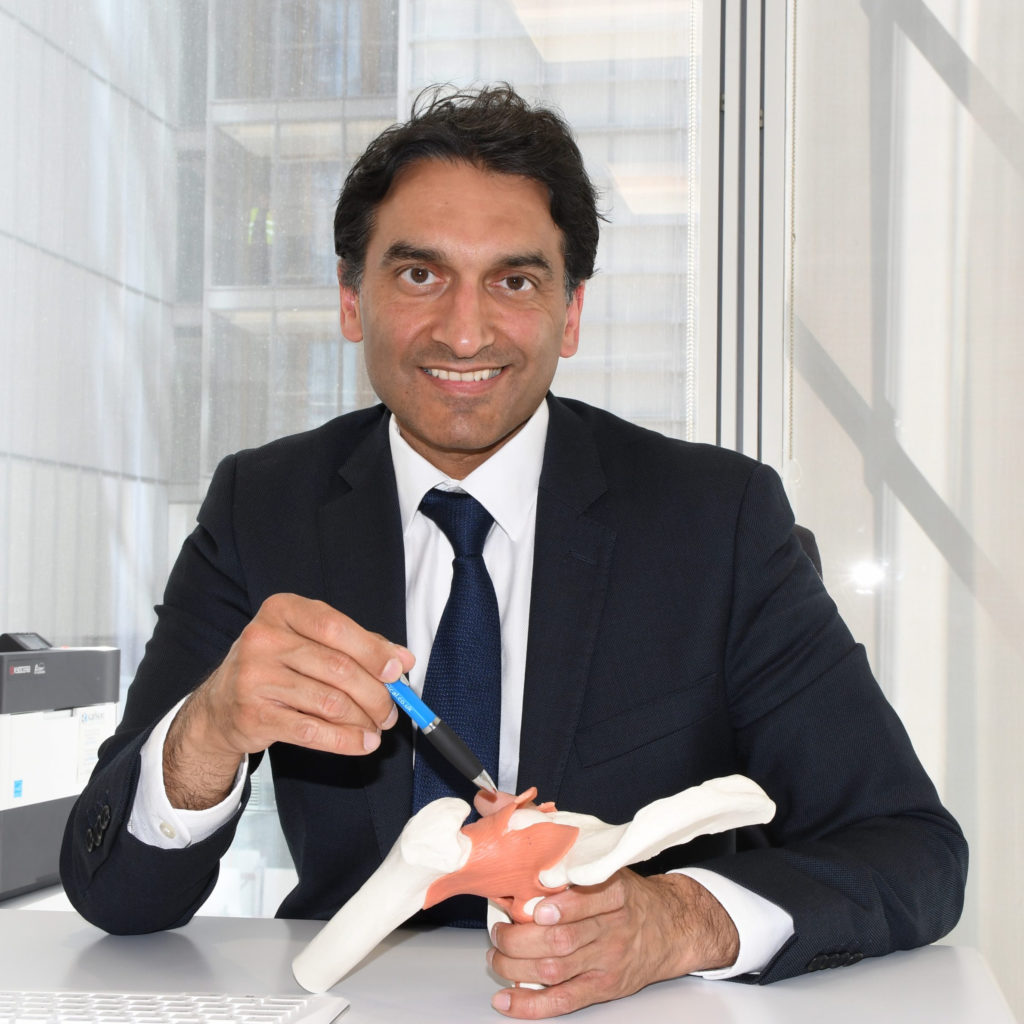
When is hip replacement surgery necessary?
by Mr Vipin Asopa, Consultant Hip & Knee Surgeon
20th July 2022
Another evening spent playing tennis. It’s usually your favourite part of the week.
But this week that niggling hip pain that you’ve had for a while has become more prominent with each jump, with each step. You’re not sure if you can carry on to the end of the match. And then there’s that aching/burning pain that you have started to experience during the night afterwards.
Of course tennis is just an example here! Maybe you are more of a footballer, a hiker, a runner… whatever your go-to activity may be, it’s often whilst doing these activities that you notice your hip pain and to what extent it’s starting to affect your day-to-day life.
Unfortunately hip pain is common, with approximately 50% of older adults saying they have either hip or knee pain [https://www.webmd.com/healthy-aging/features/hip-pain-as-you-age]. Pain from arthritis is usually in the groin. Other causes of pain around the hip can include inflammation (bursitis) or tendon tears on the outside of the hip (gluteal muscles). Sometimes these occur in isolation and other times they may be associated with osteoarthritis of the hip joint.
It is important to remember that there are many orthopaedic/musculoskeletal causes of hip pain both inside the ball and socket joint and outside the joint other than arthritis. Sometimes abdominal (such as hernia) or gynaecological problems can cause hip pain. Back pain is also an important sign: trapped nerves or a tight spinal canal can contribute to pain and difficulty with balance.
If low back pain or hip pain is severe, troubles you at night, does not settle with simple painkillers, or is getting worse, you should see a specialist.
Arthritis or injury are common causes of hip pain. Hip osteoarthritis, considered a degenerative condition of the hip joint (sometimes called wear and tear), is related to ageing, previous injury and genetic factors.
The cause of symptoms is due to the breakdown of cartilage lining the surface of the ball and socket joint. This can result in the bone articulating with bone. Pain is caused by the cartilage degeneration and secondary inflammatory change that can occur.
Symptoms may become worse as the condition progresses. However, the choice of treatment is not based on what the x-ray looks like, but how you are affected by arthritis. If your symptoms are well controlled and there is little limitation on your activities, it may be appropriate to consider little or no treatment for the time being. If, on the other hand, you have severe symptoms disturbing your sleep and limiting walking, then you may be more likely to consider other treatment options.
Hip pain may be managed with medication, physiotherapy or even simply doing nothing and waiting to see if the pain subsides. However, for some, hip replacement surgery may be required.
So let’s further explore how we know when it is required. What are the tell-tale signs that hip surgery may have become necessary?
- There are indicators that you may notice yourself such as difficulty with your day-to-day activities.
- There are signs that your surgeon will look out for.
One of the most significant indicators of needing a hip replacement is when your quality of life has become affected due to pain. This is often due to the pain becoming more severe and walking becoming more of a struggle. You may notice the following:
SEVERE HIP PAIN
- You may be getting pain at night, and this could cause you to wake up more throughout the night and so you’ll become more tired.
- You may notice you need to take painkillers more often for the pain.
LIMITED WALKING AND MOBILITY
- You may be limited by how far you can walk.
- Your hobbies or work may be affected as you struggle to do the usual activities that you enjoy.
- General day-to-day life such as popping to the shops or driving might become difficult.
- You might need to use an aid such as a crutch or walking stick.
DIFFICULTY WITH DAILY LIVING ACTIVITIES
- You may find it difficult to put your socks and shoes on.
- You may have difficulty with cutting toe nails.
When asked how she knew she needed hip replacement surgery, one patient explains:
“It got to the point where I was completely reliant on crutches to get around and my hip pain would wake me up at night. I was struggling to work and socialise and knew that something had to change to improve my quality of life.”
As well as discussing your pain level, how this affects your activities and examining you, I will look at other indicators including examining an x-ray of your hip to understand the extent of your arthritis. Sometimes cartilage damage can be difficult to detect on an x-ray and an MRI scan of the hip may be required. An MRI scan of the back may also be useful if there is concern that your symptoms may be originating from a problem in the spine.
If the hip joint has worn down and you have symptoms affecting your quality of life, your surgeon will likely discuss the various treatment options available. These usually include: doing nothing, pain relief, activity modification, injections or total hip replacement. Alternative options for the treatment of advanced arthritis can include specialist pain management. I can refer you to a pain management specialist who can discuss the various non-joint replacement options available including extra medication or nerve blocks.
As your surgeon, I will discuss the risks with you which can include: infection, clots in the legs and lungs (deep vein thrombosis: DVT / pulmonary embolism: PE), dislocation, failure of the implant, damage to nerves and blood vessel and death (rare but important to discuss). Your medical fitness will be an important factor and you may require a special medical assessment to confirm your fitness and risks for surgery.
Where required, additional measures are taken to ensure surgery is as safe as possible. For example, using antibiotics in the preoperative period to reduce the risk of infection and providing medication to reduce the risk of deep vein thrombosis.
Special attention and great care is always taken to minimise the requirement for blood transfusions following surgery. I have cared for people who have expressed a wish to not have blood transfusions should they require it (for example Jehovah’s Witnesses).
Some patients may not wish to have hip surgery due to the possible risks. As your surgeon, I work with you to decipher what the best course of action is for you, as the patient.
I hope this blog has given you some idea as to how you may know that you need hip surgery. If you would like to read more about arthritis, my blog on the subject is coming soon.

ABOUT THE AUTHOR
Mr Vipin Asopa, PhD, FRCS (Tr & Orth), MBChB, BSc (hons)
Mr Asopa is a Specialist Consultant Hip and Knee Surgeon in London, with a particular focus on hip pain, knee pain and sports injuries. Mr Asopa performs numerous surgical procedures including hip and knee joint replacements, arthroscopy as well as treating arthritis, ligament injuries, trochanteric pain and more.
To book an appointment with Mr Asopa:
Call: +44 (0) 794 319 1592 | Email: admin@ortho-surgery.uk
Vipin Asopa was my surgeon and performed a total hip replacement for me in sept 2021. I had stage 4 osteoarthritis in my right hip and was in complete agony on a daily basis. My quality of life was rock bottom, I struggled with everything from putting shoes on to driving my car. I will be forever grateful to Dr Asopa for giving me my life back. It wasn’t the easiest of recoveries but with determination and regular exercises I can honestly say, it’s the best thing I’ve ever done. Thank you so much
Comments are closed.